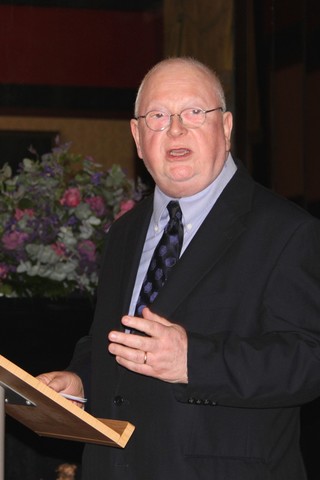My Lords, Ladies and Gentlemen,
I am honoured to welcome you to the Polish Embassy on this special occasion. During this Holocaust Memorial Day concert we will hear Julian Dawes's moving song-cycle 'Songs of Ashes' composed to the words of Jerzy Ficowski's fifteen poems on the tragic subject of the Holocaust. I am very grateful to Mr. Dawes for bringing this concert to the Polish Embassy. Julian Dawes has worked extensively as a composer, accompanist and teacher. He has written scores for many theatre productions in the United Kingdom including credits at the Royal Court, The Riverside Studios, The Arts Theatre and The Bristol Old Vic. A versatile author, he has written choral music, chamber music, music for the concert hall, cantatas, oratorios, as well as thirteen song-cycles including the one we will hear tonight. Julian will talk a bit more about 'Songs of Ashes' in a moment. I would like to extend a special welcome to our wonderful performers. You will find their short bios in the leaflets provided. I would also like to thank Mrs. Nitza Spiro for co-organising tonight's commemoration. The Spiro Ark's restless efforts for Jewish-Polish dialogue and its wider educational and cultural work are extremely valued by us here at the Embassy.
Yesterday we were commemorating the 70th anniversary of the liberation of the Nazi German concentration and extermination camp Auschwitz-Birkenau. 300 survivors of the camp as well as officials from many countries paid their respects at a special ceremony at the Auschwitz Memorial. On the same day and with events around this significant date, all over the world, we are marking the Holocaust Memorial Day. In Poland this anniversary is perhaps more significant than anywhere else. As President Bronisław Komorowski said in his speech yesterday: "Poland is a special depositary of Holocaust remembrance". Three million Polish Jews and many thousand Polish Roma perished in the Shoah. In addition, three million Christian Poles were exploited as slave labour throughout The Reich or imprisoned in Nazi German concentration camps, including 350 000 in Auschwitz. Hundreds of thousands of them died. Many camps were located by the Germans on occupied Polish soil, thereby marking our country forever with the painful memory of what happened during the Second World War. And even if these memories hurt, we wish to remember for our own sake, for the sake of the whole world, and for the sake of next generations.
Also 75 years ago, Poles were the first to report to the world of the Nazi German crimes at Auschwitz and other camps. Professor Michael Fleming proves in his new book, which we launched at the Embassy last week, that the archival material available today unequivocally demonstrates that the Western Allies had the means to find out about Auschwitz as early as December 1942 and January 1943, and they were subsequently advised of what was happening there throughout 1943 and 1944. The news about the wider Holocaust reached the West from occupied Poland even earlier than that. It is important to highlight that the Polish Government in Exile, residing in London, played a significant part in supplying this information, which it was acquiring through various means from the Polish Underground State. The Polish government, in publications, press articles, and in diplomatic notes reported extensively on Auschwitz and other camps. Jan Karski - a Polish diplomat, who served as a courier between the Polish Underground State in occupied Warsaw and the Polish Government-in-Exile in London - was the first person to give, as early as in 1942, an eye-witness account of the Holocaust to the Western Allies - British and American politicians, including US President Franklin D. Roosevelt and UK Foreign Secretary Anthony Eden. Another remarkable Polish war hero Witold Pilecki volunteered for an operation to get imprisoned at Auschwitz in order to gather intelligence. While in the camp, Pilecki organised a resistance movement and created a comprehensive report for the Polish Government-in-Exile on the structure of the camp and the Nazi German atrocities committed on its prisoners. He escaped from the camp in 1943 after nearly 3 years of imprisonment.
But the focus tonight is on the victims of the Holocaust and the survivors whose presence here tonight is of incredible value to all of us. Thank you for accepting our invitation. I hope that the music we will hear tonight will allow us all to reflect on what happened in those dark days.
Thank you.
webspoadmin




